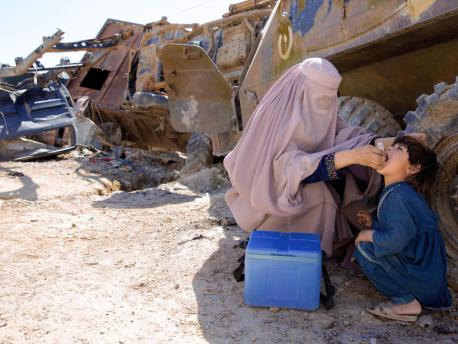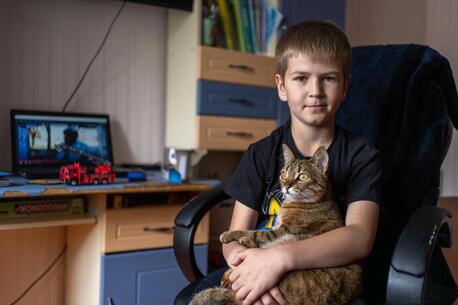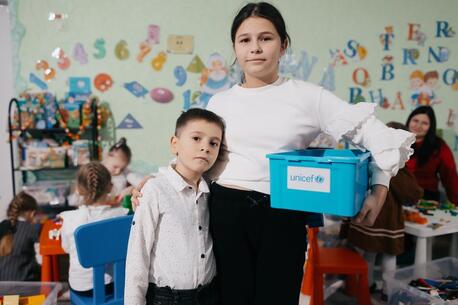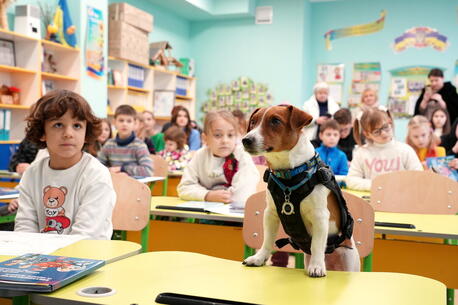
Immunization Under Fire
UNICEF and partners are working tirelessly all over the world to save and protect children.
Almost 8 million unvaccinated or under-immunized children live in fragile or humanitarian settings, including countries affected by conflict. Growing up surrounded by violence disrupts and endangers children's lives, and all too often prevents them from getting the immunizations they need to survive.
"Conflict creates an ideal environment for disease outbreaks," said UNICEF Chief of Immunizations Robin Nandy. "Children miss out on basic immunizations because of the breakdown — and sometimes deliberate destruction — of vital health services. Even when medical services are available, insecurity in the area often prevents them from reaching children."
All children have the right to survive and thrive. UNICEF is tailoring new approaches to vaccinate every child in every community — no matter how remote or challenging.

Four years of civil war in Yemen have crippled the country's health system, but health care professionals are working valiantly to ensure that children across the nation receive the immunizations they need to stay healthy. Above, a local health worker carries vaccines in a cold-chain container from Dhamar, Yemen to reach children in remote, high-risk areas as part of a massive mobile measles and rubella vaccination campaign backed by UNICEF in early 2019. © UNICEF/UN0284435/Al-Qaflah

Villages have been burned, schools destroyed and health centers looted by rebel groups fighting for control in the Democratic Republic of the Congo (DRC), leaving nearly 8 million children in need of humanitarian assistance. UNICEF has scaled up integrated health, water, sanitation and hygiene (WASH), nutrition and other services to address this complex and challenging situation. Above, a brave boy receives his measles vaccine during a UNICEF-supported vaccination campaign in Impfondo, DRC in March 2019. © UNICEF/UN0287582/Diefaga

Above, Liubomyr, 8, and his brother Bohdan, 6, hold hands after the school nurse gave them their measles, mumps and rubella vaccinations at Mykolaiv Gymnasium in western Ukraine's Lviv region in February 2019. Repeated shelling has battered WASH and health care facilities and other infrastructure in Ukraine; half a million children need humanitarian assistance and protection. Working with partners in 2019, UNICEF aims to immunize 80 percent of the country's children against diphtheria, tetanus, pertussis, measles, mumps, rubella and polio. © UNICEF/UN0284879/Filippov

A seven-year siege in Douma, East Ghouta, Syria displaced families and devastated schools and health care facilities. Of the original 32 primary health centers, only eight are currently in service. Above, an infant is vaccinated in December 2018 at the Eastern Douma Primary Health Center, operated by the local department of health and supported by UNICEF. In February 2019, UNICEF-backed vaccinators immunized approximately 10,000 children during a 9-day mission to the remote makeshift settlement of Rukban at the border with Jordan. © UNICEF/UN0264253/Sanadiki

Above, in May 2018, two UNICEF-backed nurses spent a day vaccinating children in the village of Salanga in the Central African Republic (CAR). Years of sectarian violence have plunged CAR into chaos. Warlords control nearly 80 percent of the nation, and routinely attack civilians and humanitarian aid workers. There is only one pediatric hospital in the entire country. UNICEF supports mobile vaccination teams who travel to remote villages to reach families too afraid to leave their homes. © UNICEF/UN0226718/Njiokiktjien VII Photo
Vaccines are the most effective weapon in the fight against childhood mortality. Together with governments and partners including Gavi, the Vaccine Alliance and the World Health Organization, UNICEF vaccinates nearly half the world's children.
Please support UNICEF's efforts to vaccinate every child, everywhere.
Top photo: UNICEF-supported polio worker Afia (name changed for her protection), 19, vaccinates a child in an old military barrack in Afghanistan in March 2018. Afia is part of one of the largest female work forces in Afghanistan: a national team of 70,000 committed polio vaccinators supported by both UNICEF and the World Health Organization. © UNICEF/UN0202762/Hibbert
HOW TO HELP
There are many ways to make a difference
War, famine, poverty, natural disasters — threats to the world's children keep coming. But UNICEF won't stop working to keep children healthy and safe.
UNICEF works in over 190 countries and territories — more places than any other children's organization. UNICEF has the world's largest humanitarian warehouse and, when disaster strikes, can get supplies almost anywhere within 72 hours. Constantly innovating, always advocating for a better world for children, UNICEF works to ensure that every child can grow up healthy, educated, protected and respected.
Would you like to help give all children the opportunity to reach their full potential? There are many ways to get involved.





